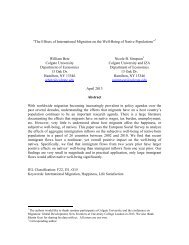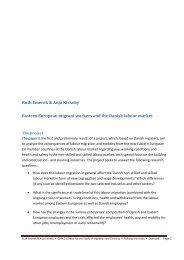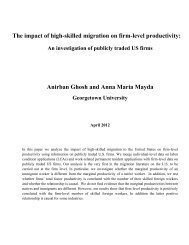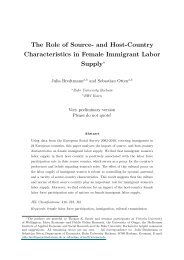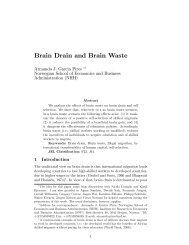La politique française de co-développement - CReAM
La politique française de co-développement - CReAM
La politique française de co-développement - CReAM
You also want an ePaper? Increase the reach of your titles
YUMPU automatically turns print PDFs into web optimized ePapers that Google loves.
potential human capital as children learn elements of local culture and language at school,<br />
and foster ties with local children. Specific training of skills and languages also improves the<br />
interaction between immigrants and locals, both children and adults.<br />
<br />
<br />
A se<strong>co</strong>nd important element is to allow for freedom to practice and share elements of<br />
culture. This implies a two-way interaction, where immigrants follow their habits and share<br />
cultural traits with locals, but also learn new ones from them. This easily extends to elements<br />
of religion, food and other rituals linked to culture and social norms. Education and training<br />
are good vectors of cultural learning and un<strong>de</strong>rstanding.<br />
A final <strong>co</strong>mponent is the support of cultural and social hometown associations (HTAs).<br />
Because messages need to <strong>co</strong>me across quickly, particularly when tensions spiral out of<br />
<strong>co</strong>ntrol, HTAs help <strong>co</strong>mmunicate messages quicker to large groups of immigrants. They also<br />
provi<strong>de</strong> lea<strong>de</strong>rship for un<strong>de</strong>rrepresented groups of society. For the many immigrants who do<br />
not speak or read the local language, it brings an aspect of representation and<br />
<strong>co</strong>mmunication, for information gathering or even for venting about en<strong>co</strong>untered problems.<br />
In addition, cultural organisations be<strong>co</strong>me instruments of expression, helping share<br />
traditions within society.<br />
3.3. Promoting social mobility<br />
Social mobility enables immigrants to increase their position in the host <strong>co</strong>untry’s social hierarchy.<br />
Immigrants are often <strong>de</strong>liberately pushed to the bottom of their host <strong>co</strong>untry’s class system, usually<br />
because of their low levels of material wealth and (perceived) human capital. Yet their ascension in<br />
society would permit a better and more efficient incentive mechanism and increase productivity.<br />
Immigrant social mobility highly <strong>de</strong>pends, however, on whether immigrants are low or high-skilled,<br />
whether they intend to stay permanent or short-term, and whether they are working in a rural or<br />
urban region. This can be achieved through easing mobility within labour markets, facilitating<br />
entrepreneurship, better job and skill-matching and promoting education.<br />
<br />
<br />
<br />
As labour markets are highly imperfect in the South, policies need to increase the benefits<br />
<strong>de</strong>rived from working as well as the mobility between the formal and informal sectors, and<br />
the barriers to better jobs. This inclu<strong>de</strong>s helping immigrants organise themselves in informal<br />
activities by promoting entrepreneurship through the provision of loans, the organisation of<br />
marketplaces and by targeting particular groups victims of discrimination (low-skilled,<br />
women).<br />
Because a lot of the benefits <strong>de</strong>rived from working in the formal sector are non-monetary,<br />
social security measures should be exten<strong>de</strong>d to informal workers, to at least inclu<strong>de</strong> housing,<br />
health and pension portability. In this respect, Chile has been one of the most active<br />
<strong>co</strong>untries, by signing bilateral agreements on pension access and portability with 23<br />
<strong>co</strong>untries, mostly regional.<br />
Job matching in and out of the immigration <strong>co</strong>untry can lead to a generally better allocation<br />
of skills and jobs. It also reduces problems due to labour shortages in seasonally high labour<br />
17



